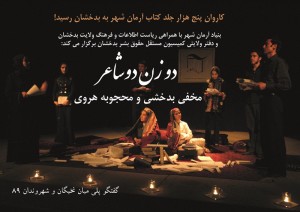Two women, two poetesses: Makhfi Badakhshi & Mahjouba Herawi
Caravan of 5,000 Armanshahr books in Badakhshan
To mark the arrival of Caravan of 5,000 Armanshahr books in Badakhshan, the 89th Goftegu debate (6th year), a bridge between the elite and the citizens, of Armanshahr Foundation, entitled “Two women, two poetesses: Makhfi Badakhshi & Mahjouba Herawi” was organised in Fayzabad, provincial capital of Badakhshan, at Badakhshan’s Culture Department’s Hall on 28 August 2012. The collaborators were the Culture and Information Department and the local division of Afghanistan Independent Human Rights Commission. More than 250 people attended, half of them women. The local media covered the meeting.
The meeting began with the screening of a drama piece with the same title that Armanshahr Foundation had produced in Kabul about the life and poetry of the two poetesses. Next, the speakers, comprising Ms Zofonoun Hassam Nategh (director of Women’s Affairs Dept and former Kabul University professor), Mr Mohammad Dinkhahani (director of Culture and Information Department) and Mr Abdulmanan Shivaye Shargh (poet and writer) offered their insights into the life and work of the two poetesses.
The meeting’s moderator, Mr Sadighi Lalzad, said: History of Afghanistan is very dark for women. The dark aspects are noticeable in the poetry of the two ladies. Makhfi Badakhshi was born, grew up, was educated and wrote poetry, all in exile.
“Life has gone by, but my sad heart has not grown happy.”
Ms Hassam Nategh reported on Makhfi’s life and literary, social, and political work based on her work and works of her contemporaries: “Makhfi was able to represent unknown women from behind the chadors and walls. Her life was full of tragedy and sadness; she suffered displacements and hardships. Three women can be well identified in her time among 6-7 million women: She, Mastoureh Ghori and Mahjouba Herawi. She was fortunate to see the first girls’ school in Badakhshan. She has said: ‘I am fortunate to be alive and witness the fulfilment of the wishes I had nurtured about education of women for many years.’
“She spent more than 20 years in prison and exile; witnessed the death of her father and brothers in exile. When the king summoned her to a meeting, she refused to go. Finally, the king went to meet her. Instead of cringing before the king, she drew his attention to destruction in Badakhshan. She always stood up against despotic rulers, and oppressive governors and civil servants.
“She was born to an arts and literature nurturing family. Her brothers chose her alias in honour of Makhfi Hendi. When she wrote poetry, her brothers corrected them for her.”
The next speaker was Mr Mohammad Dinkhahani, director of Culture and Information Department, who spoke about a strange time, when the young generation is going through moral degeneration.
He went on: “Even though the class origins of Makhfi Badakhshi and Mahjouba Herawi were far apart, they both spoke about oppression and suffered from it. In response to bullying and fanaticism, they say: ‘We have broken the seal of silence of our fathers.’”
He argued that the two women were among the founders of women’s movement in Afghanistan.
“Makhfi Badakhshi’s poetry is now available to the public in many districts of Badakhshan. We organised a seminar in our Department in 2007, where many writers, poets and researchers read out their writings and research papers.”
Addressing the young people of Badakhshan, he said: “Cultural degeneration is on the rise despite the growth of cultural and social institutions. The young people are not interested in reading books now. Instead, they engage in permissiveness and moral corruption. Young boys and girls do not have security in Badakhshan today. The structure of life in Badakhshan is in disarray now.”
The last speaker, Mr Shivaye Shargh spoke about the historical despotism that plagued all the progressive people of the era of Abdur-Rahman Khan. He said: “If history has brought blood, rage and violence for men, it has brought the worst for women of Afghanistan; whereby the king has written in the exile order of Makhfi Badakhshi: ‘You may not even get married.’
“We have only two women in the history of Afghanistan, who have offered their thoughts on freedom and rights in the context of poetry: Makhfi Badakhshi and Mahjouba Herawi.”
He went on to argue that the lack of consciousness on the part of women has pushed them to deprivation and lower status. Women of Afghanistan shall gain their human value when they review their past context. Women of the present day must revive the historical courage of Badakhshi if a repetition of that context is to be avoided, deprivation is to come to end and they are to achieve justice, freedom and rights.”
Invitation to 89thGoftegu Public Debate: Caravan of 5,000 Armanshahr books in Badakhshan



